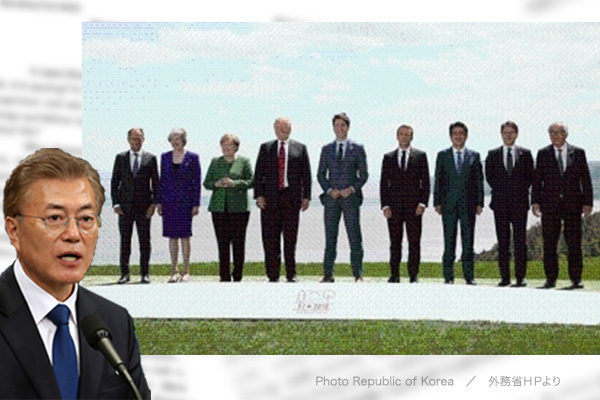Is South Korea under President Moon Jae In qualified to join a club of liberal democracies?
British Prime Minister Boris Johnson has announced a plan to invite India, Australia, and South Korea as guests to an annual summit of the Group of Seven industrial democracies that he will chair next year. Johnson would like to “work with a group of like-minded democracies to advance shared interests and tackle common challenges," the British government said in a statement. London has nurtured a D10 concept for the 10 democracies -- the G7 nations plus the three countries -- to cooperate in countering China.
The United States has also been seeking to unite democracies. President-elect Joe Biden has vowed to hold a summit of democracies in the first year after his incoming inauguration. Although no specific countries are named for the summit, it is apparently designed to counter China and Russia.
Anti-North leaflet ban running counter to democracy
South Korea is a traditional U.S. ally. Some 40,000 American soldiers died in the Korean War to defend South Korea’s liberal democracy. As South Korea is an advanced economy with per capita gross domestic product topping $30,000, it may be qualified to join a group of industrial democracies on that regard.
But the South Korean National Assembly on December 14 passed a bill banning activists from using balloons to carry leaflets criticizing North Korea across the North-South border, leading critics to doubt if South Korea under the government of President Moon is a liberal democracy. The Tom Lantos Human Rights Commission, a bipartisan caucus of the U.S. House of Representatives, reportedly plans to hold a public hearing on the ban in an amendment to the North-South Relations Development Act. UN special rapporteur on the situation of human rights in North Korea also has expressed a critical view about the law.
On December 16, South Korean Foreign Minister Kang Kyung Wha said that freedom of expression was important but not an absolute right and that anti-North leaflets would be banned only when citizens’ lives and safety are threatened. She explained that North Korea could respond to leaflet balloon launches with military attacks. Defending the amendment as democratic, the South Korean Ministry of Unification said that the National Assembly representing the will of the people amended the act through democratic discussions and deliberations according to procedures stipulated in the constitution and law.
Giving help to dictatorship
Not only anti-North leaflet balloon launches near the border would be banned. Citizens would also be banned from sending prints, other goods, money, or other financial benefits to North Korea. They would be punished for sending USB memories containing South Korean dramas or music or handing goods to North Koreans in third countries. North Korean exiles in the South may also be punished for sending money to their relatives in the North.
Punishing people for providing information to North Koreans suppressed by the dictatorship is tantamount to giving help to the dictatorship in a manner to run counter to liberal democracy. The South Korean government promised to enact the anti-North leaflet ban immediately after North Korean dictator Kim Jong Un’s sister Kim Yo Jong criticized such leaflets. This is why the amended act is called “Kim Yo Jong Act.” Given that Nazi Germany took advantage of majority decisions for building a totalitarian regime, no country can protect democracy with democratic procedures alone. I strongly doubt if South Korea as it is now can be invited as a liberal democracy to the G7 summit.
Tsutomu Nishioka is a senior fellow and a Planning Committee member at the Japan Institute for National Fundamentals and a visiting professor at Reitaku University. He covers South and North Koreas.


